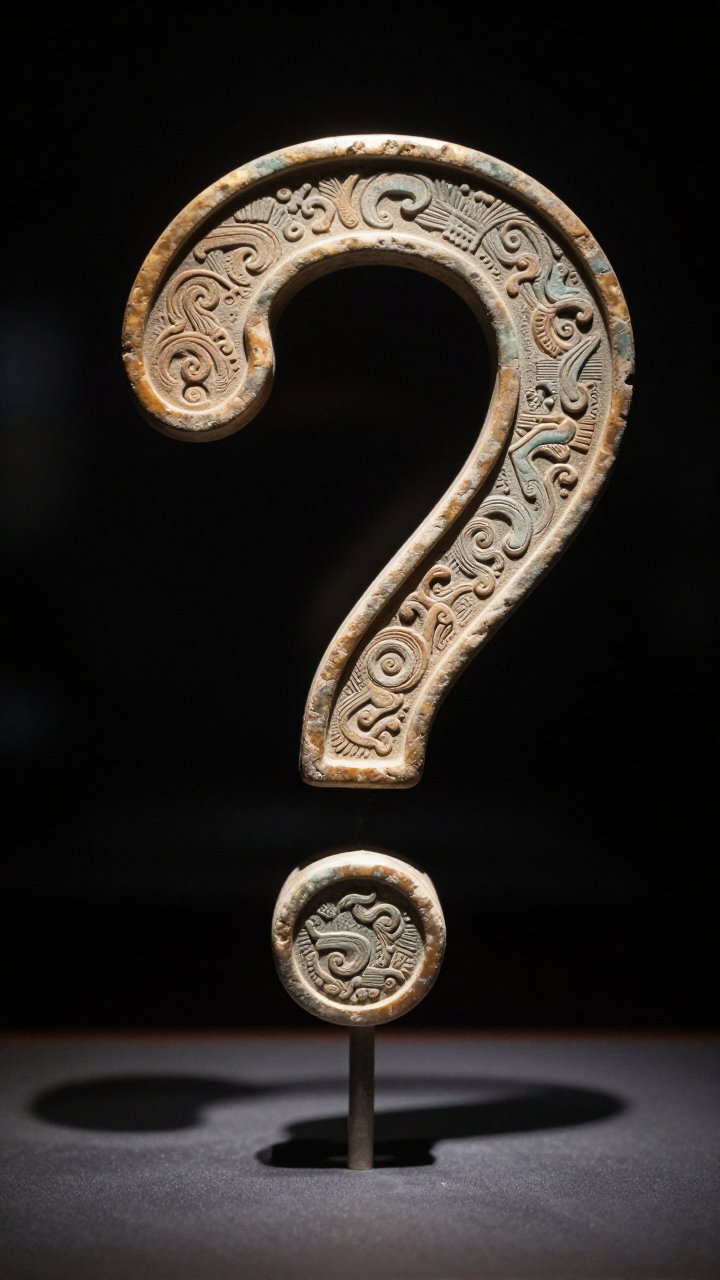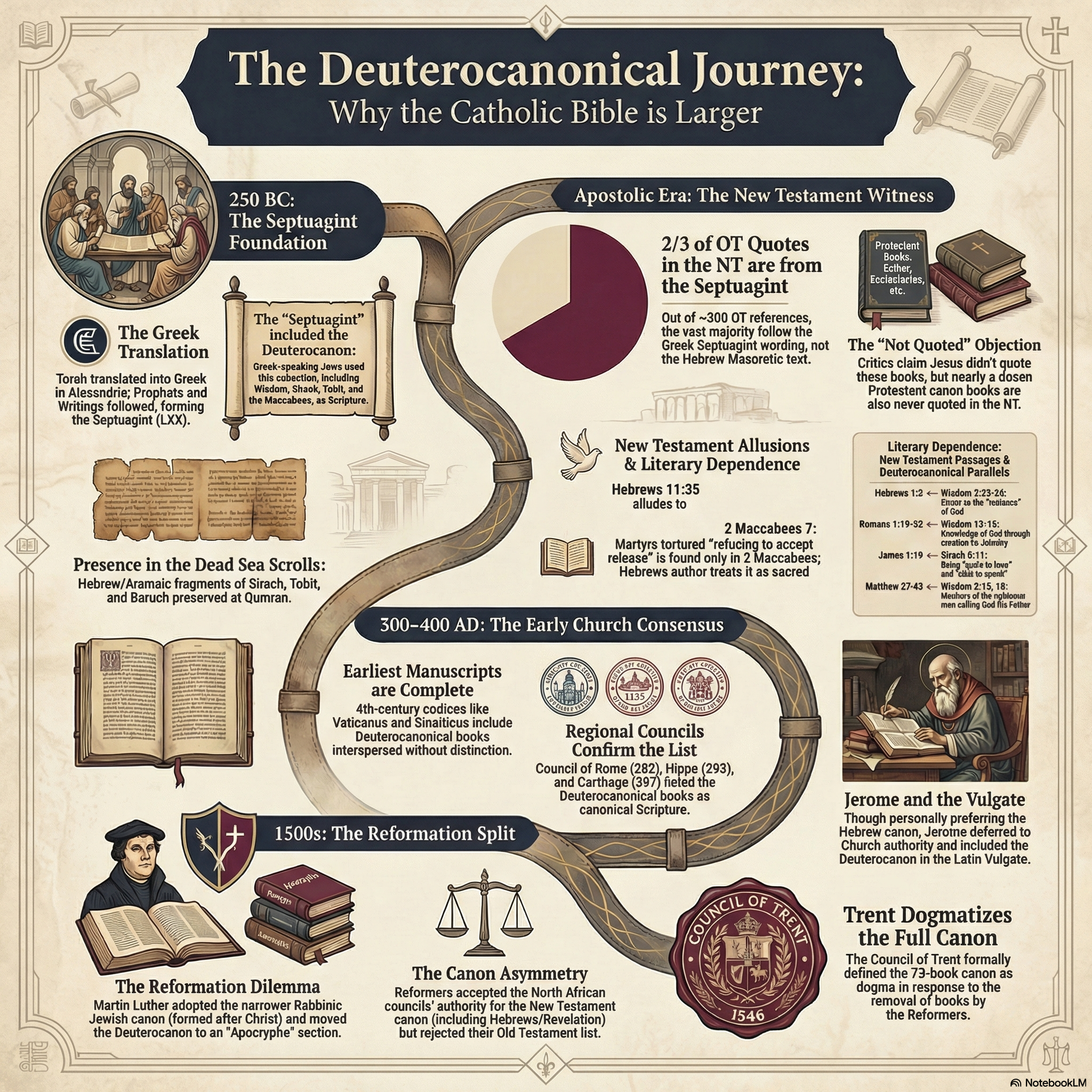
The DeuteroCanon
What’s the mystery about these old testament writings and why are the missing from some bibles?
The deuterocanonical books were written during roughly 300-100 BC and were included in the Septuagint, the Greek translation of Jewish Scriptures completed around 200 BC in Alexandria, Egypt. While Palestinian Jewish communities later favored the Hebrew written books, the Septuagint containing the deuterocanonicals was widely used by Greek speaking Jews throughout the Mediterranean world, including in the time of Jesus and the apostles.
The DeuteroCanonical Books of the Old Testament - A Catholic Perspective
What Are They?
The deuterocanonical books are seven books (plus additions to Esther and Daniel) that are included in Catholic Bibles but were removed from Protestant Bibles during the Reformation:
Tobit
Judith
1 Maccabees
2 Maccabees
Wisdom (of Solomon)
Sirach (Ecclesiasticus)
Baruch (including the Letter of Jeremiah)
Additions to Esther
Additions to Daniel (Prayer of Azariah, Susanna, Bel and the Dragon)
Historical Timeline
Original Christian Bibles (1st-15th centuries) These books were included in Christian Bibles from the beginning. The early Church used the Septuagint (Greek Old Testament), which contained these books, and they were included in the Latin Vulgate, the standard Bible of Western Christianity for over 1,000 years.
The Removal (16th century) Martin Luther and other Protestant Reformers removed these books during the Reformation (1520s-1530s), arguing they should follow the Hebrew canon that was solidifying in Jewish communities (particularly around 90 AD) rather than the Septuagint used by the early Christians.
Catholic Response (1546) The Council of Trent definitively declared these books to be inspired Scripture, reaffirming what had been the practice of the Church since apostolic times.
Protestant Practice Early Protestant Bibles (including the King James Version of 1611) actually included these books in a separate section between the Old and New Testaments. Most Protestant denominations gradually stopped printing them entirely in the 19th century.

Before Christ: The Septuagint
There is a story most Christians have never heard. It is not a complicated story, but it has been buried under centuries of assumptions, and once you see it clearly, it changes the way you understand how scripture came to us. It changes the way you understand the Reformation. And it raises a question that nobody has ever satisfactorily answered. But we are getting ahead of ourselves. Let's start where the story actually begins.
The Book That Changed Everything
Around 250 BC, something remarkable happened. The Torah, the five books of Moses, the very foundation of Jewish scripture, was translated from Hebrew into Greek. Think about what that means for a moment. These were sacred texts. Holy scripture. The word of God handed down through centuries of careful, reverent transmission. And now, for the first time, they were being put into the common language of the Mediterranean world.
The tradition says this happened in Alexandria, Egypt, during the reign of Ptolemy II Philadelphus. There is even a story about it, preserved in something called the Letter of Aristeas, though scholars tell us that many of the details in that letter are more legend than history. What is not in doubt is that the translation began in the third century BC. That much is solid.
But the Torah was only the beginning. Over the next century and a half, the rest of the Hebrew scriptures, the Prophets, the Writings, all of it was gradually translated into Greek as well. This was not one big project done all at once by one group of scholars. It was a slow, ongoing effort, carried out by various Jewish translators over roughly a hundred years.
When it was finished, or rather, when it had grown large enough to stand on its own, this Greek collection of scripture came to be known by a name you have probably heard before: the Septuagint. The word itself just means "the Seventy," a reference to the traditional story about the original Torah translators.
Now here is something important. Greek was not some foreign language that Jews reluctantly picked up. It was the language of the world. Jews living outside of Judea, what we call the diaspora, increasingly spoke Greek in their daily lives. The Septuagint became their scripture. It was how they read the word of God.
And the Septuagint included books that are not in the Protestant Bible today. Among them were Wisdom, Sirach, Tobit, Judith, Baruch, and First and Second Maccabees, along with expanded versions of Daniel and Esther. Some of these, like Sirach, were originally written in Hebrew and later translated into Greek. Others, like Wisdom, were composed in Greek from the very beginning. But all of them were part of this Greek scripture that the Jewish world used.
One more thing worth noting before we move on. There was no single, universally agreed upon list of sacred books that bound every Jew in this era. Different communities used different collections. The Septuagint was widely accepted among Greek speaking Jews, especially in Alexandria and throughout the diaspora. It was their Bible. And it is the Bible that the early Church inherited.
When Jesus Was Born
Jesus is born around 4 BC. The New Testament is written between roughly AD 50 and AD 100. And here is where the story gets interesting.
When the New Testament authors quote scripture, they quote the Septuagint. Not sometimes. Not occasionally. The vast majority of the time. Of the roughly three hundred Old Testament references in the New Testament, about two thirds follow the Greek wording of the Septuagint rather than the later Hebrew text that scholars call the Masoretic Text.
Think about what that tells us. It tells us which scriptures were actually being used. Which scriptures were in the hands of the apostles when they taught. Which scriptures the early believers carried with them.
Now, you will not find a moment in the New Testament where someone sits down and produces a formal list of Old Testament books. It does not work that way. The New Testament authors simply assume the scriptures that were already known and received. They treat them as given.
But here is what is fascinating. Several passages in the New Testament contain close literary parallels with books that are in the Septuagint but not in the Protestant Bible. Now, to be precise about this, these are not direct quotations. Scholars are careful to call them allusions, echoes, literary parallels. But they are significant enough that anyone reading carefully will notice them.
Take Hebrews 11:35, for example. It speaks of believers who were tortured and refused to be released, because they were hoping for a better resurrection. That story, that specific account of martyrdom, is found in Second Maccabees chapter 7. You will not find it anywhere else in the Old Testament. Nowhere. So where did the author of Hebrews get it? From the scriptures the Church had already received.
Romans chapter 1 makes arguments about the knowledge of God available through creation and the folly of idolatry that closely follow the reasoning found in Wisdom chapters 13 and 14. The Letter of James echoes Sirach again and again in its teachings on wisdom, on speech, on the dangers of wealth.
The apostles never warn Christians away from any of these books. They never draw a line and say, "These are in. Those are out." They simply use what they have been given. And what they have been given includes these books.
The First Centuries
From the first century through the third, Christians inherited their Old Testament primarily through the Septuagint. Greek remained the dominant language of scripture and worship across much of the Roman Empire. And the books that were in the Septuagint, including the ones that are not in the Protestant Bible today, were read, used, and treated as scripture.
Clement of Rome, writing around AD 96, referenced both Judith and Wisdom in his letter to the Corinthian church. He treated them alongside other scripture without hesitation. Irenaeus of Lyon, writing around AD 180, quoted from these books in his theological arguments. Clement of Alexandria and Cyprian of Carthage, both writing in the second and third centuries, did the same.
Now, to be fair, the picture was not entirely uniform. A few writers, including Origen, expressed some reservations about certain books, particularly regarding their relationship to the Hebrew scriptures. So there was some variation, some debate at the margins. But for the great majority of the early Church, these books were part of the inheritance. They were read in worship. They were used in teaching. They were handed down from the apostles as scripture.

The Manuscripts
Here is where the evidence becomes very hard to argue with.
Our earliest nearly complete Old Testament manuscripts date from the fourth and fifth centuries. And they tell us exactly what the early Church considered scripture.
Codex Vaticanus, dating to around 350 AD, includes Wisdom, Sirach, Baruch, and the expanded portions of Daniel right alongside Genesis, Psalms, and Isaiah.
Codex Sinaiticus, also from around 350 AD, includes Tobit, Judith, Wisdom, Sirach, Baruch, and First and Second Maccabees.
Codex Alexandrinus, from the fifth century, preserves most of the same collection.
And here is the thing that matters. These manuscripts do not set those books apart. They do not mark them as secondary or put them in a different section or add little notes saying "this one is optional." They are copied right alongside the books that every Christian today would call scripture, with no visible distinction drawn between them.
Someone copying these manuscripts in the fourth and fifth centuries did not see two categories of scripture. They saw one.
What Happened on the Jewish Side
In AD 70, Rome destroyed Jerusalem and the Temple. And that changed everything for Judaism.
In the decades and centuries that followed, the rabbinic Jewish community began the work of preserving and consolidating Jewish religious life without the Temple. This community, centered initially at a place called Yavneh (sometimes called Jamnia), became the dominant force in shaping Judaism going forward.
Now, for a long time, scholars told a very clean story about this. They said that around AD 90, the rabbis at Yavneh held a council and formally closed the Jewish canon of scripture. They drew the line and said, "These books are in. Everything else is out." It was a neat, tidy explanation.
The problem is, it is not quite true.
That theory was first proposed by a scholar named Heinrich Graetz back in 1871. But since the 1960s, scholars have taken a much harder look at the evidence, and the picture has become considerably more complicated. Modern scholarship now holds that no single formal council convened to settle the question of the canon all at once. What the rabbinic sources actually show us is an ongoing series of discussions, stretching from the late first century well into the second and third centuries, in which the status of certain books was debated.
And here is something interesting. The only books that the sources specifically mention as subjects of discussion at Yavneh are Ecclesiastes and the Song of Songs. Not Tobit. Not Wisdom. Not the Maccabees. No book is recorded in the sources as having been formally excluded at that gathering.
What is clear is that over the course of the second and third centuries, rabbinic Judaism gradually moved toward a scripture collection drawn exclusively from Hebrew texts. Greek texts, particularly those used by Christians, fell out of favor within rabbinic circles.
But that later development does not, by itself, tell us what scripture looked like during the lifetime of Jesus and the apostles. It represents a process that unfolded after the Temple was destroyed, and in many respects, in response to the rise of the Church itself.
Jerome and the Great Tension
In 382 AD, Pope Damasus I commissioned the foremost biblical scholar of his day, a man named Jerome, to produce a reliable Latin translation of the Bible. Jerome worked on this translation for roughly two decades. The result became known as the Vulgate, and it remained the standard Latin Bible of Western Christianity for well over a thousand years.
So you would think Jerome's position on these books would be simple. It is not.
Jerome had genuine reservations about books that did not survive in Hebrew. In his prologues, he was quite direct about this. He argued that anything not found in the Hebrew scriptures should be classified as apocrypha. He specifically named Wisdom, Sirach, Judith, and Tobit. He did acknowledge that the Church read them for the edification of the faithful. But his personal preference was clear.
And yet. Jerome translated these books. He included them in the Vulgate. In several places, he showed deference to the judgment of the Church on the matter. In his prologue to Judith, he wrote that he had included the book because the Council of Nicaea had counted it among the sacred scriptures. In his reply to Rufinus, he defended the Deuterocanonical additions to Daniel, writing that he had simply followed the judgment of the churches. Some of his later writings quote from Sirach with the language of scripture.
So what was Jerome actually saying? Scholars are still debating that question. Did he ultimately reconcile his personal doubts with the Church's position? Or did the tension remain throughout his life? We do not know for certain. What we do know is that whatever Jerome thought privately, the Vulgate he produced included these books. And that Vulgate became the Bible of Western Christianity for a thousand years.
The Councils
Before the regional councils of North Africa weighed in on the question of scripture, Pope Damasus I had already convened a synod in Rome in 382 AD that listed the books of the Bible, including the books we have been talking about.
Then the council at Hippo in AD 393 listed the books of scripture as they were actually read in the African churches. A summary of those proceedings was read and accepted at the Council of Carthage in AD 397. The council at Carthage in 419 compiled and reaffirmed everything that had come before, including the canon of scripture.
Now, these councils described what they were doing as recording what had been received from the Fathers. They were not inventing a new list. They were writing down what the Church had already been reading and using in worship for generations. The canon that emerged from these councils corresponds to the Old Testament canon of the Catholic Church today.
These councils also sent their lists to Rome, which tells us something about how they understood their own authority. They were not acting as final arbiters on their own. They understood themselves to be contributing to an ongoing process within the whole Church.

The Reformers and Their Dilemma
In the sixteenth century, Martin Luther looked at these books and made a decision. He was convinced that Christians should ground their arguments in scripture that the Jews of his own time accepted. So he adopted the narrower Hebrew canon that had become standard in rabbinic Judaism. He placed the Deuterocanonical books in a separate section of his German Bible, between the two Testaments, and labeled them "Apocrypha." Useful for reading, he said. But not scripture on the level of the Holy Books.
Luther also had doubts about parts of the New Testament. He considered Hebrews, James, Jude, and Revelation to be disputed books and separated them from the rest. His criticism of James was particularly sharp. These books were never formally removed from Lutheran scripture, but the fact that Luther questioned them is worth remembering as we come to what follows.
Early Protestant Bibles, including the first King James Version of 1611, actually kept the Deuterocanonical books. They put them in a separate intertestamental section, but they were there. It was not until later editions, after the British and Foreign Bible Society began omitting them in 1825, that their removal from Protestant Bibles became common.
But here is the deeper question that the Reformation raised, and it is one that has never been satisfactorily answered.
Luther and his successors appealed to the authority of the rabbinic Jewish canon as the standard by which to judge which Old Testament books were truly scripture. Think about what that means. They placed the authority to define scripture in the hands of a Jewish community that had assembled its narrower list after the Temple's destruction, in the centuries following Christ, and in a context shaped in part by that community's rejection of the Christian faith.
At the same time, the Reformers rejected the authority of the Christian Church to define and hand on scripture. But it was precisely that Church, and not the rabbinic academy, that had received these books from the apostles. It was that Church that had preserved them in worship and teaching for over a thousand years. It was that Church whose earliest manuscripts included them without distinction.
And there is one more piece of this puzzle that is very difficult to get around. The Reformers accepted the testimony of the North African councils, Hippo and Carthage, for the canon of the New Testament. Including disputed books like Hebrews and Revelation. But they rejected the testimony of those same councils regarding the Old Testament.
The same councils. The same authority. Accepted in one case. Rejected in the other.
That asymmetry has never been satisfactorily resolved.
Some Protestant scholars have responded to this argument by saying that the Reformers did not actually accept the New Testament canon on the authority of those councils. They argue that the councils simply recognized what the Church had already received through apostolic witness, and that the New Testament books carried their own self authenticating authority through that witness. It is a reasonable point as far as it goes. But notice what it actually concedes. If the standard for receiving scripture is apostolic witness preserved through the Church, then the question becomes a simple one: which community actually received these Old Testament books from the apostles and carried them forward? The answer the historical record gives us is not the rabbinic academy. It is the Church. The Protestant response, in trying to sidestep the authority of the councils, ends up reinforcing the very principle that supports the Catholic position.
What the Record Actually Shows
The Deuterocanonical books were not added late to the Christian Bible. They were not a medieval invention dreamed up by the Church to support some later doctrine.
They were part of the scriptures used by Greek speaking Jews before Christ was born. They were received by the early Church through the Septuagint. They were echoed in the New Testament. They were preserved in our earliest and most complete manuscripts. They were listed as scripture by the councils of the late fourth century, and before that, they were read in worship and used in teaching by the Church Fathers.
The history of these books is not without its complexities. Jerome struggled with them. The formal definition of the canon stretched over centuries and involved genuine debate. The relationship between what the Jews accepted before Christ and what the Church received after Him is not a simple line drawn in the sand.
But what the historical record does show, when you look at it honestly and from the beginning, is a continuity of use and inheritance. Not a sudden addition. Not a break with the past. A story of scripture being received, preserved, and handed on from one generation to the next, by the community God entrusted with His word.
The question of which books belong to scripture is, in the end, a question about authority. About who God gave the power to receive His word, to guard it, and to pass it on across the centuries. That is not a question the historical record alone can answer. But the historical record does not contradict the Church's answer. It supports it.



